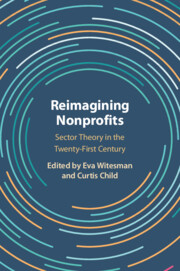Book contents
- Reimagining Nonprofits
- Reimagining Nonprofits
- Copyright page
- Contents
- Figures
- Tables
- Contributors
- Acknowledgments
- 1 An Invitation to Rethink the Nonprofit Sector
- Part I Overviews
- Part II Reflections and Refinements
- 5 Sector Theorists Should Consider How Social Values Determine Unmet Needs
- 6 Sector Theorists Should Embrace a Social Economy Perspective
- 7 Sector Theorists Should Expand Three-Failures Theory to Include the Family Sector and Varied Forms of Government
- 8 Sector Theorists Should Be Wary of the Nonprofit Industrial Complex
- 9 Sector Theorists Should Be Inclusive of Muslim and Non-Western Perspectives
- 10 Sector Theorists Should Revisit the Role of Information
- 11 Sector Theorists Should Borrow Epistemologies
- Part III New Directions
- Part IV Conclusion
- Index
- References
6 - Sector Theorists Should Embrace a Social Economy Perspective
from Part II - Reflections and Refinements
Published online by Cambridge University Press: 11 January 2024
- Reimagining Nonprofits
- Reimagining Nonprofits
- Copyright page
- Contents
- Figures
- Tables
- Contributors
- Acknowledgments
- 1 An Invitation to Rethink the Nonprofit Sector
- Part I Overviews
- Part II Reflections and Refinements
- 5 Sector Theorists Should Consider How Social Values Determine Unmet Needs
- 6 Sector Theorists Should Embrace a Social Economy Perspective
- 7 Sector Theorists Should Expand Three-Failures Theory to Include the Family Sector and Varied Forms of Government
- 8 Sector Theorists Should Be Wary of the Nonprofit Industrial Complex
- 9 Sector Theorists Should Be Inclusive of Muslim and Non-Western Perspectives
- 10 Sector Theorists Should Revisit the Role of Information
- 11 Sector Theorists Should Borrow Epistemologies
- Part III New Directions
- Part IV Conclusion
- Index
- References
Summary
In this chapter, Mook and Whitman provide a critique of the dominant three-sector paradigm, which categorizes organizations into distinct public, private, and social sectors based on their legal status. The critique is inspired by the social economy perspective that focuses attention on the dynamic intersection of the sectors as part of a mixed economy. The social-economy model acknowledges the blending of sectoral elements and the evolution of different types of organizations in the political economy. The authors explain this perspective, contrast it with the three-sector paradigm, and provide an example of how it allows us to reexamine societies and better conceptualize the work of organizations with social objectives. The closing calls for a movement to balance the political economy in favor of humanity and the world.
Keywords
- Type
- Chapter
- Information
- Reimagining NonprofitsSector Theory in the Twenty-First Century, pp. 113 - 132Publisher: Cambridge University PressPrint publication year: 2024

